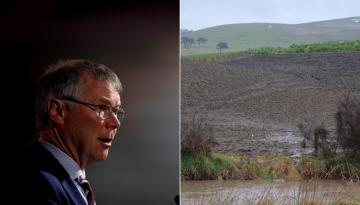
The chair of a winter grazing action group says farmers will face high levels of scrutiny if poor practices are put on display this season.
Intensive winter grazing happens when stock are strip fed a crop, but when done poorly the practice can create animal welfare and environmental issues.
Regulations aimed at addressing this were supposed to come into effect from May, but were recently deferred until 2022.
The Winter Grazing Action Group, established in early 2020 and comprised of Government, industry and expert representatives, was tasked with implementing recommendations to improve animal welfare in winter grazing systems.
In August it released a document setting out its short-term expectations for the industry.
Group chairperson Lindsay Burton told farmers at a deer industry conference in Invercargill on Wednesday changes to their practices would have to be at least partly self driven.
"We just need to think of ways we can improve and those solutions are going to come right across the sector, they're not necessarily going to come from a regulator in Wellington, so don't expect them to come from [the Ministry for the Environment].
"They're solutions that the New Zealand farming community has developed over the years and will continue to develop."
Burton said there was high exposure on winter grazing practices in the central North Island as well as much of the South Island, which farmers should keep in mind this year.
"Collectively I believe we just continue to manage the situation, take it forward, show the initiatives that need to be shown. If we don't, we'll get dealt to."
Burton emphasised keeping easy access to clean drinking water and having clean and comfortable areas for stock to lie down as the key factors for improving animal welfare.
Southland regional council chief executive Rob Philips told farmers at the conference while there had been an improvement in practices last winter, more work was still needed to be done.
"What was acceptable 10 years ago is not acceptable any more, so we've got to work hard at 'how do we get better wintering systems?'."
Deer Industry New Zealand environmental manager Lindsay Fung said the industry had a "critical" year to develop better winter grazing practices, but he was confident his sector was well placed to manage this.
"We know that this season is going to be a crunch time for winter grazing ... we should expect heavy scrutiny from the public.
"No farm is perfect but we have some very switched on farmers that more often than not will change practice if problems or issues are pointed out to them ... and by-and-large I think our farmers are good stewards of the land."
Taking a holistic approach to managing freshwater protection, reducing emissions, and fostering biodiversity would help to address those three issues at the same time, he said.
RNZ


